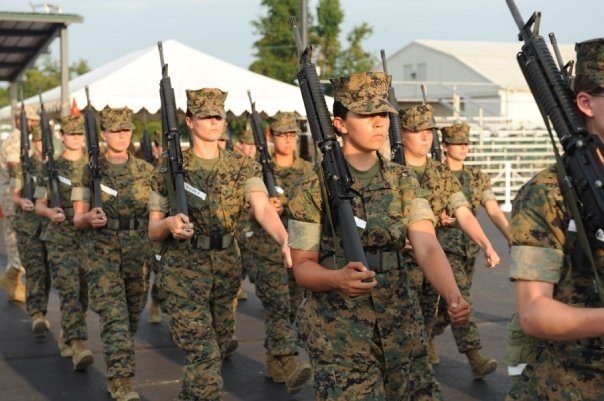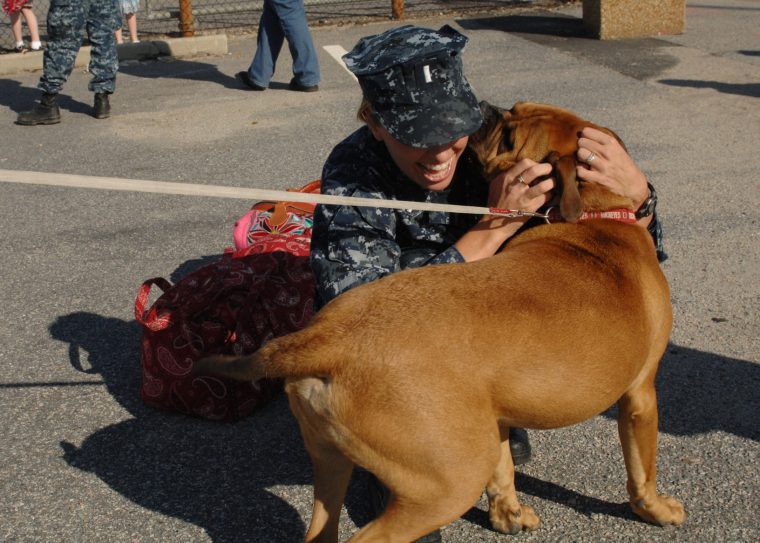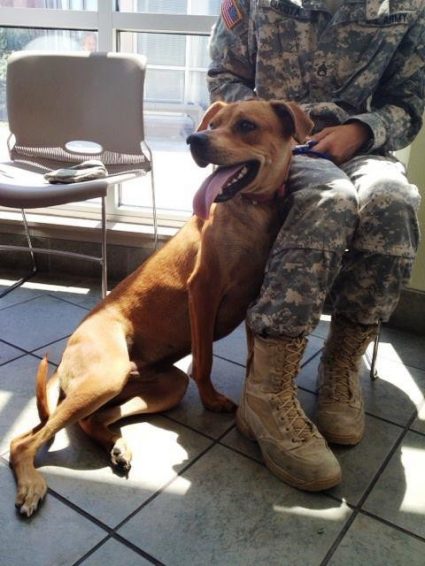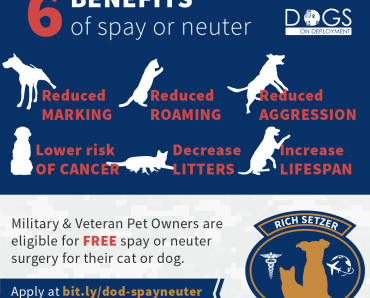by Alisa Johnson, President Dogs on Deployment
In the past decade, the call to arms of our military service members has increased. Operational tempo has caused men and women of the Armed Services to have to constantly deploy, sometimes unexpectedly, and sometimes much longer than initially anticipated. Even in the growing peacetime environment, military members are increasingly being used in the global environment. This has a substantial impact on the families of those service members; even those with four legs who are usually under recognized.
Military members who own pets (cats, dogs, or other) face unique challenges in being responsible pet owners while also being able to serve their country any way needed at a moments notice. Their service can come into conflict with their ability to care for their pets. In the past, this has unfortunately led to many pets being surrendered to animal shelters for lack of better options.
That’s changing.

Alisa and Shawn Johnson, founders of Dogs on Deployment, with their dogs.
In 2011, my husband and I founded Dogs on Deployment (dogsondeployment.org) to provide support to the military-pet community. As a dual military husband and wife, who currently own two miniature Australian Shepherds and two Caique parrots, we have been in situations where we were unable to give care to our pets due to deployments and training cycles. We were lucky to have family who were able to dog and parrot sit for us, but recognized that many military members do not have that luxury. Thus, we founded the largest network of volunteer DoD Boarders, or foster homes, who are willing to care for a military-owned pet during the owner’s service commitments. Dogs on Deployment promotes responsible, lifelong pet ownership for those who serve.
Despite Dogs on Deployment’s best efforts to reach all military personnel, there will always be those that do not know our organization exists. Thus, they may end up needlessly turning their pet into a shelter due to a service commitment.
The first thing that needs to be understood is the different service commitments which can jeopardize a military pet owner’s ability to care for their pet.
- Permanent Change of Station (PCS) is a military commanded move where a military member, and potentially their dependents, is ordered to move from one duty station to a next. These moves may be an internal move within the 50 US States, or a move to an international country. Typically, a PCS has no restriction on the ability for pets to accompany a military member, with the exception of some jobs which are unaccompanied (no dependents or pets allowed). Travel and health requirements for pets are not usually covered by the US Government and is at the expense of the owner. Pets may travel by air or by ground/personal vehicle, depending on the service member’s travel orders. PCS moves may prompt a pet being relinquished due to a variety of reasons. Owners may be on unaccompanied orders and unable to take their pets with them. Owners may be moving to a county or country where the breed or type of pet they own is banned. Owners may be unable to afford the cost to ship their pet, especially overseas (though there are organizations that provide financial assistance). Owners may be required to live in base housing at their next duty station and may be over the maximum pet limit or own a banned animal. Lastly, and a most unfortunate truth, is some owners do not want the hassle of moving a pet with them.
- Deployments are military ordered trips to overseas ports, bases, ships or operating areas in support of the US’ foreign policy. Deployments typically last 6-12 months, but may be shorter or longer, and are subject to change at any time. Because of this unreliability of scheduling, which is an accepted risk of military service, pet ownership may be difficult in a constantly changing environment, especially for service members who do not have a family support system. Military members may relinquish their pets before a deployment because of a plan that fell through, lack of options or lack of education. Occasionally, we hear of military pets that are surrendered by the caregiver entrusted by the military member when the owner is deployed.
- Training is a constant priority and requirement for all branches of the Armed Services and may range from a weekend trip to over a year. Though training is typically planned with foreknowledge of the service commitment, last minute changes to either the training mission or personal situations may cause an owner to surrender a pet.
-

Founded, Alisa Johnson, in formation at Officer Candidate School. Her husband watched her dog during training.
Boot Camp is an initiation for all branches of services to enlist in the Armed Forces. Officer Candidate School is the equivalent for an officer to commission. When new members of the Armed Forces join, they may believe that their future career in the military may conflict with their long term ability to be pet owners, thus they may relinquish their pets before leaving.
It is important to recognize the difference in those owners that care deeply for their pets and truly do not know of other options, and those owners that are seeking an easy way to rid themselves of an inconvenience. Reflecting the general population, most military members are responsible and loving pet owners, but there still exist those that do not view their pet as a permanent family member. This is not to say all military members are bad pet owners. No matter what the attitude of the pet owner, shelter staff should always offer options other than relinquishment. Having a thorough knowledge of military-pet support organizations, such as Dogs on Deployment, can help military members make an educated decision in the future of their pet. This knowledge should also be passed on to any military family before an adoption by the shelter is made.

A military member greets her dog Tressel after returning home from a two-month deployment.
Ensuring a pet is never needlessly surrendered starts at the source of the adoption. We hope that shelters, if manpower permits, will spend a bit extra time with military families considering adopting a pet. Ensuring that all adopters realize a pet is a forever commitment is important, but especially in the military community where a constantly changing living situation may cause pet ownership to be challenging. Considering asking the military member the following questions to start:
- How long have you been in the military? A newly joined service member will often spend the first year or more moving around in training commands. This may not be conducive to pet ownership right away.
- When do you next deploy? If a known deployment is coming up soon, now may not be the right time to adopt. However, if they are in a shore tour, or ‘B-Billet’ where they are not deployable for a year or longer, now might be a good time to adopt.
- Are you financially able to care for a pet? While all military members are paid a guaranteed salary, this does not necessarily mean they will be able to care for a pet financially, especially in the case of an emergency or overseas move. Family expenses, debt or other financial obligations may take priority over pet care, and thus adoption may need to be put on hold until they are more financially stable.
- Where are you currently living? Most military members are able to live in housing of their choosing. However, some may be required to live in the barracks, where pets are strictly forbidden, or on base housing, which usually has strict pet policies. No matter where they are living, ensuring that the potential adopter is aware of their current pet policy will ensure they don’t make a mistake by adopting a pet which is outside their policy. If there is a chance that they may be stationed overseas, they need to be aware of the expense and responsibility of bringing their pet if able, and must be willing to do it.
- Are you considering adopting a bully breed? While Dogs on Deployment loves and promotes bully breeds, sometimes bully breed ownership can be extremely difficult to impossible while serving in the military. Bully breeds are not allowed on most bases, are often unable to be transported via air and are banned in many geographic locations where a military member might end up. If owning a bully breed may be conflicting to their future life in the military, they may want to consider adopting a breed which does not have these problems.
- What is your support system like? Military members may be moved far away from their family and support system. Married military members may have a spouse for support, while unmarried military members may have no one. It is important that a military member is aware of the support system they have available should they ever need to rely on a friend or family member to care for their pet in their absence. If a support system does not exist, Dogs on Deployment is there to fill in, but should not be used as a primary plan
- Do you understand that adopting a pet is a lifetime commitment? This is a given to anyone adopting a pet. The difference for military members is that anytime a military member turns in a pet due to a military commitment, they are degrading the image of all military pet owners. Military members provide the moral standard for the American public, and as such, have an obligation to do what’s right. If a military member believes that they can turn their pet back into a shelter when it is no longer convenient to have, they should not be allowed to own pets; whether in the service or not.
If these questions are carefully considered by the military member before adoption occurs, there should be a correlating decrease in the number pets relinquished by military members to shelters. Adoption processes can help better evaluate potential homes by asking these difficult questions and getting a sense for their long term goals as a pet owner. Before accepting an adoption, adoption agencies can go the extra step to provide information on military-pet assistance programs, such as Dogs on Deployment. If a military member is not in a position to permanently adopt a pet, inform them on fostering; keeping a pet for a short term period, while also saving that pets life, may be appealing and give them the experience of pet ownership for a temporary period.
Even by taking these precautions, pets may still end up in shelters; at worst, a kill shelter. The general public does not usually know that a pet which is surrendered by the owner will be the first to be euthanized over strays. Shelter staff can have a great impact of the future of the pet with the following considerations:
- Was the owner hoping to find other options? An owner who loves their pet and believes there to be no other option than to surrender with an upcoming deployment is the best intake a shelter can hope for. The solution is simple; refer the owner to Dogs on Deployment or similar group. With luck, the owner will have enough time to take their dog home and try to find a foster home.
- Are they leaving tomorrow but still have hope? If an owner has procrastinated, constantly hoping to find a temporary home for their pet, but each plan fell through, and they are leaving tomorrow, refer them to Dogs on Deployment, and if possible, offer them a temporary stay in the shelter or in a foster home. Create a release form for the owner to sign which will entail that the owner will work to find a foster home for their pet, and if one can be found, that foster home can pick the pet up from the shelter to keep until the owners return. This has been successfully done through Dogs on Deployment before; an owner turned their dog into a shelter with hope to find someone through our network. The shelter kept the dog for a week until a foster home was found and was able to pick the dog up for the remainder of the deployment. This arrangement allowed the dog to live in the care of a foster home until the owner returned with the help of the shelter staff.
- Are they only interested in permanently rehoming their pet? If a military owner is only interested in permanently rehoming their pet, they have that right to do so, but they should ensure they do so humanely and smartly. Shelters should be honest with pet owners over the likelihood of their pet making it out alive. Some owners have no idea that by surrendering their pet to their local shelter, they are literally putting their pets life in danger. If the owner has the time, offering them advice on other ways of rehoming their pet might make for a better outcome for the longevity of their pet.
Despite all efforts, did they still relinquish their pet? If an owner does not wish to find a foster home or attempt to find a better permanent home, that pet may be surrendered to a shelter. If this happens, it is most unfortunate. Promoting the adoption of a military surrendered pet by using an owners military service has both negative and positive consequences. Common captions of military surrendered pets on social media site include, Owner was deployed and had no other option, or The past owner is defending our freedom, let help save their dog. While these captions will spike interest in the public, they are also detrimental to the image and public opinion of military pet owners as they leave an open forum for speculation and criticism.

This dog was surrendered to Animal Control due to a deployment. He was fortunate to have been adopted through positive social media sharing.
Since there are options for pet care, but it requires prior planning, responsibility and research on the owners part, saying an owner had no other option can spike extreme resentment and criticism towards military members. All animals, no matter how they end up in a shelter, are equally deserving of finding a new home. By using careful and honest captioning, shelters can notify potential adopters or rescues of the reason a pet was surrendered, while also maintaining the overall dignity of the majority of pet owners who serve in the military.
The best thing shelters can do is emphasize responsible pet ownership for potential military adopters and offer better solutions if a military member is considering surrendering their pet due to an upcoming service commitment. Majority of pet owners in the military are responsible, good people. We cannot stop bad pet owners from making bad decisions, but we can stop good owners from making regretful mistakes.





